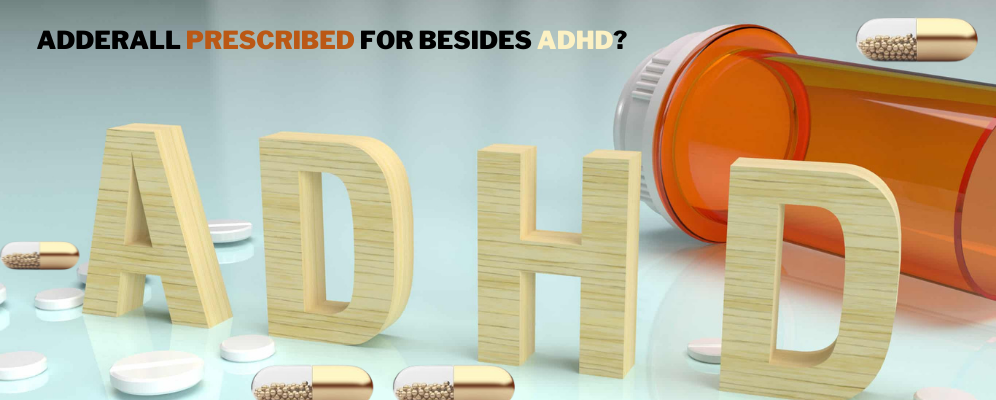
Prescribed for Besides ADHD
Adderall is a potent stimulant drug that comes in a quick and extended dosage form. FDA approves the immediate form of this drug for treating ADHD or narcolepsy, while an extended form of this medicine is approved for treating ADHD only. Both these forms are classified as schedule II controlled substances, which means they have a high potential for addiction, dependence, and abuse. An individual who is not recommended Adderall sometimes abuses this drug, wanting to take it for losing weight or increasing focus while studying.
The effects of Adderall are different in people with ADHD and people without ADHD. It improves attention and alertness in individuals with ADHD, as it can increase the amount of dopamine available in the human brain. The use of this medicine in an individual without ADHD releases an excess amount of dopamine in the brain to make them feel high. In addition to feelings of euphoria, an individual can experience fatal emotional and physical side effects.
As a potent stimulant, Adderall can rev up the system in your body. It may feel similar to when the fight-or-flight mode of reaction is triggered, resulting in effects such as:
- tremors
- restlessness
- irritability
- increased heart rate
- blurry vision
- wide pupils
Adderall effects on ADHD patients
Adderall affects people suffering from ADHD by improving attention or focus and reducing impulsivity. Adderall for individuals suffering from ADHD helps by enhancing the amount of norephedrine and dopamine in the patient’s brain, which helps in increasing the activity of the central nervous system.
For individuals suffering from ADHD with low function of dopamine, taking stimulants such as Adderall can be helpful to alleviate the symptoms of ADHD, which may include problems with:
- task completion
- organizations
- listening and following directions
- concentration
- focus
- short attention span
- hyperactive behaviors
Effects of Adderall on narcolepsy patients
Narcolepsy is a chronic neurological condition that may affect your nervous system. It can cause abnormal sleep problems that affect people’s quality of life.
It is a rare condition that is estimated to affect about one in 2000 people. The symptoms of narcolepsy usually start between the ages of 7 to 25. although it is often not recognized the right way and often gets misdiagnosed. This condition generally begins in the mid-teenage.
Narcolepsy is a condition that may cause significant daytime drowsiness and sleeping attacks or an urge to fall asleep. In some cases, it may also cause a temporary and unexpected loss of muscle control, also referred to as cataplexy. It can be mistaken for seizure activity, especially in children. This is now known as narcolepsy type 1. Whereas, when cataplexy is absent, it is referred to as narcolepsy type 2.
It is not a deadly condition by itself, but some episodes can result in injuries, life-threatening situations, and accidents. Additionally, individuals suffering from narcolepsy may have difficulty maintaining jobs, maintaining relationships, and doing well in school due to episodes of excessive daytime sleepiness.
Various treatments are available to manage the conditions. Stimulants such as Adderall stimulate the central nervous system and are the primary treatment to help an individual with narcolepsy stay awake during the day. A medical professional may recommend Adderall as the first-choice treatment for narcolepsy.
Adderall is a bit more addictive than older stimulants and produces some lows and highs that are often associated with older stimulants.
Effects of Adderall on people with depression
Depression is a mental health condition that can affect a number of people. In fact, a major depressive disorder is a primary and leading cause of this condition for people ages 15 to 45 in the USA. According to a survey, more than 16 million people over the age of 18 are affected by this condition. Also, some organization states that about 3 million people get affected by persistent depressive disorder. It is a form of depression that can last for almost two years.
Various prescription drugs help to treat the symptoms of depression. Antidepressants are the primary type of drugs that are often recommended. Adderall is not an antidepressant but a drug that may help an individual struggling with depression.
Maybe you have read that stimulants help ease some of the symptoms of depression. You may have even heard that it can be effective in treating depression. Adderall is a potent stimulant that is composed of two central nervous system stimulants, amphetamine, and dextroamphetamine. When these two drugs reach your brain, they act as naturally occurring neurotransmitters norepinephrine, dopamine, and epinephrine.
The brain chemical dopamine is widely referred to as a reward neurotransmitter. Adderall can sometimes cause a feeling of euphoria from the effects the medicine has on the brain’s dopamine. It may also help your brain from getting distracted. Epinephrine is tasked with ramping your body up inti\o the fight-or-flight mode. It triggers your clarity, focus, and alertness. On the other hand, norepinephrine helps to increase focus.
Can Adderall trigger your depression?
Usually, Adderall is not recommended for treating depression; it treats the symptoms of ADHD and sometimes narcolepsy. May some children use it to feel sad and listless. If the dose is too heavy, a child may look sedated.

Children diagnosed with ADHD may feel depressed, to begin with, due to the challenge of having ADHD. However, it is necessary to note that heavy doses of this medicine can sometimes cause depressive symptoms.
FDA does not approve Adderall for treating depression, but that does not mean it cannot treat it. Some studies have shown how some symptoms of depression improved from taking a psychostimulant, such as Adderall, coupled with conventional antidepressants. In one study, most patients in a medication trial, including Adderall, concluded that half of the 65 patients showed significant movement, particularly with respect to energy, psychomotor activity, and mood.
Can Adderall help to treat anxiety?
Anxiety is the most common mental disorder all across the globe, and Adderall is one of the most recommended drugs available. Due to the prevalence of anxiety and how well Adderall can boost the attention effects, it is understood that many people may attempt to take this medicine to treat this mental health condition. However, this medicine cannot treat anxiety and can actually make your symptoms worse.
So, it is necessary to know that recommending Adderall for treating anxiety is uncommon. Adderall is not an anti-anxiety drug but rather a stimulant that can help to boost an individual’s attention span, energy, and motivation. The medicine, a combination of amphetamine and dextroamphetamine, is frequently abused by students to attain long study sessions to remain attentive and fend off drowsiness.
As stated before, Adderall is generally not prescribed for treating anxiety. However, the medicine might be prescribed for an individual with fear when the disorder co-occurs with ADHD or narcolepsy. In many cases, narcolepsy and ADHD can have effects that may result in anxiety. Some examples include when an individual has poor performance at work or school due to not paying attention or when regular daytime drowsiness interferes with completing daily tasks.
Can Adderall trigger your anxiety?
Adderall increases the number of neurotransmitters present in your brain. These natural chemicals can help to boost the person’s mood and result in feeling high while under the effects of this medicine. The increased brain activity that occurs when an individual takes stimulants can result in anxiety.
For some people, Adderall may cause anxiety more indirectly. Since it increases euphoria effects or feeling good neurotransmitters in the brain, individuals can experience negative feelings as the medicine’s effects wear off. The number of neurotransmitters reduces as your body readjusts its chemical balance. The boost in energy can get replaced with overwhelming drowsiness. An individual with temporarily improved self-confidence can diminish in favor of increased anxiety due to lower than usual self-esteem. This process is known as withdrawal.
Additionally, if individuals take it consistently, they could develop a chemical dependence on the medicine. The reliance can form addiction and cause people to feel anxious when not using the drug.
Conclusion
Adderall can be beneficial medicine for an individual with narcolepsy and ADHD. However, it is a schedule II controlled substance, the treatment can also increase the risks of addiction. Suppose you struggle with taking more Adderall than prescribed or rely on this drug even though your medical professional has not prescribed the medicine. In that case, you may be at risk for Adderall addiction.

Leave a Reply